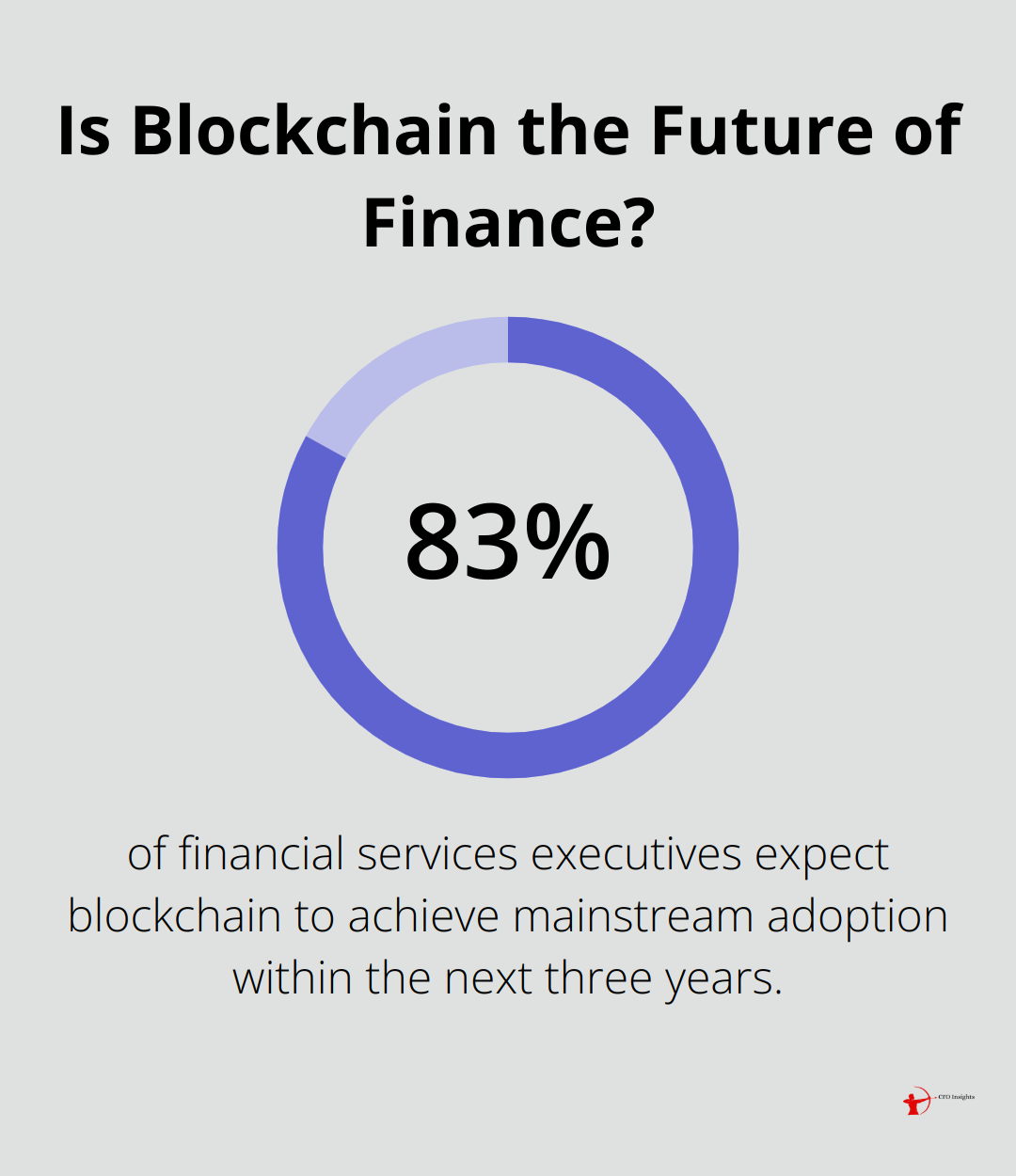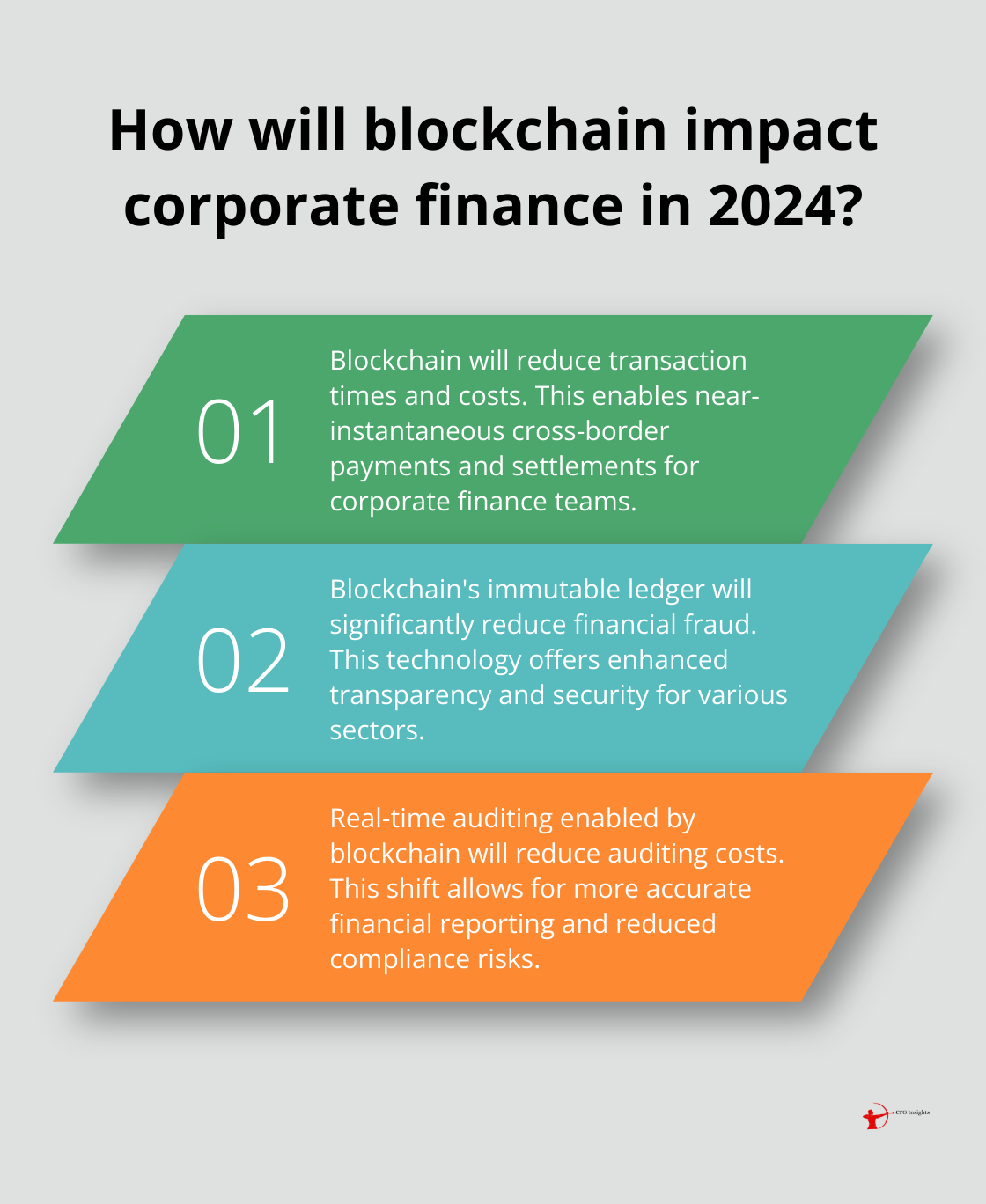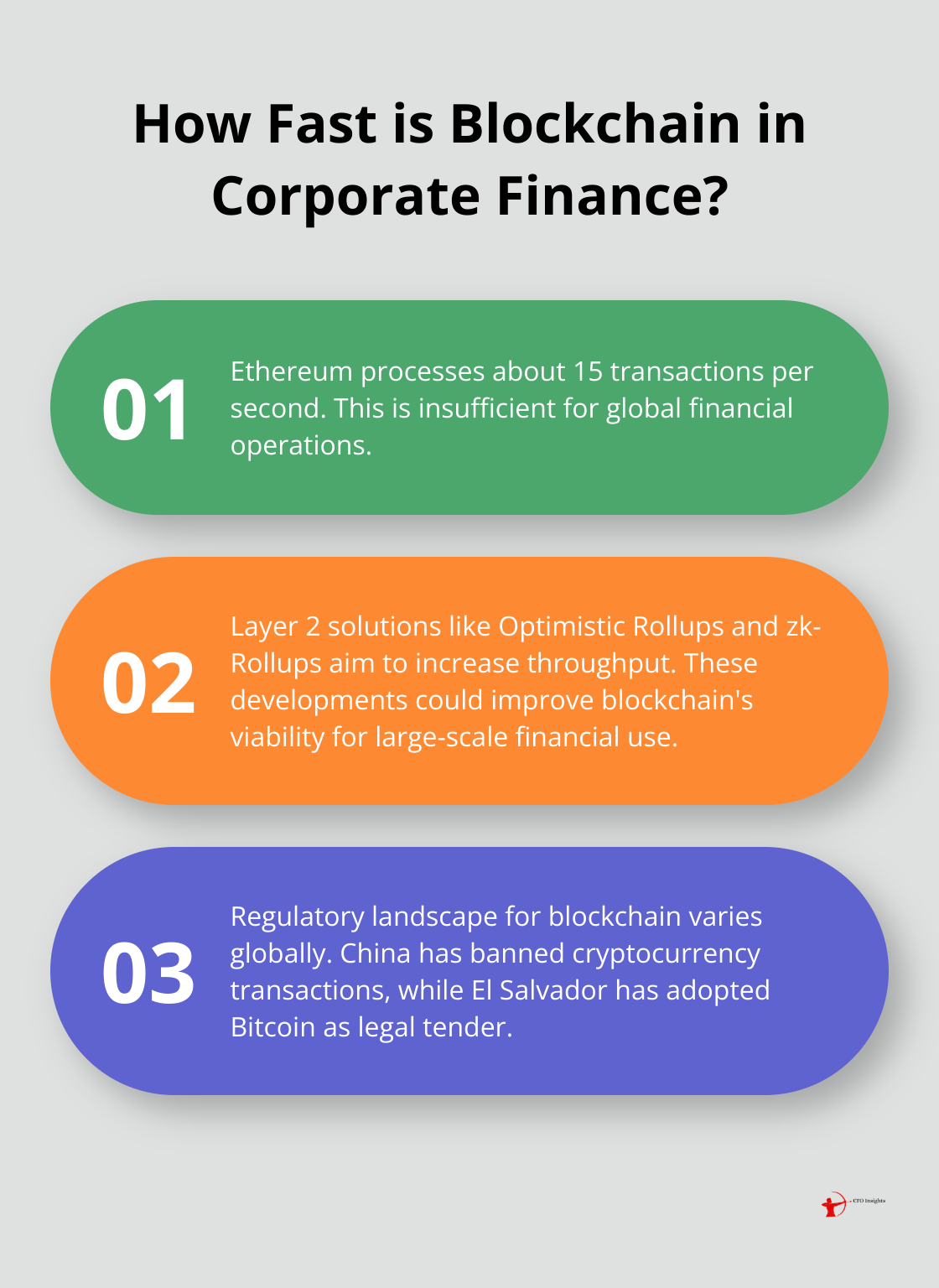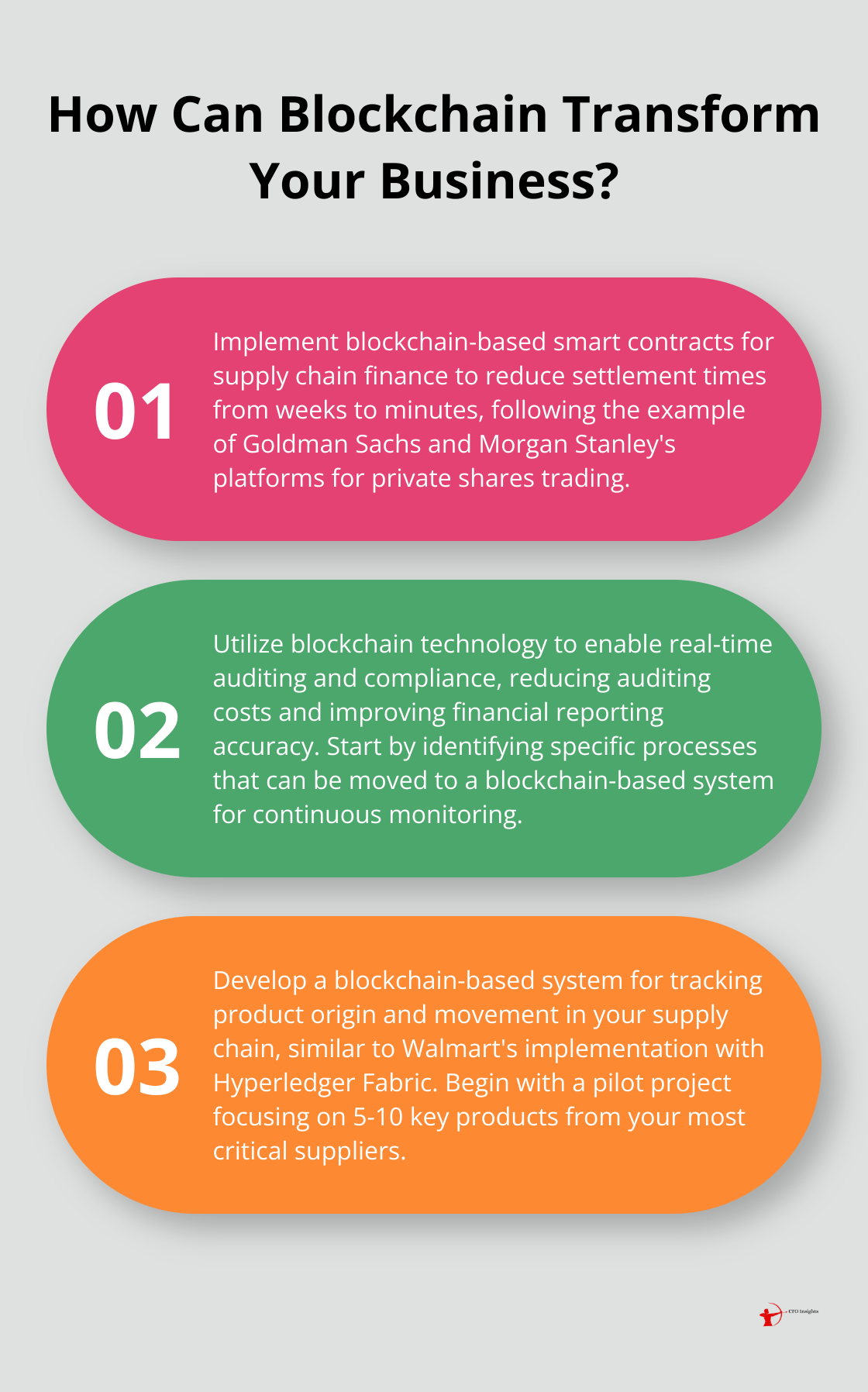Blockchain technology is poised to revolutionize corporate finance in 2024. At CFO Insights, we’ve observed a surge in blockchain adoption across various industries, with finance leading the charge.
This transformative technology promises to streamline financial processes, enhance transparency, and reduce fraud. However, challenges like scalability issues and regulatory uncertainties remain significant hurdles to widespread implementation.
How Blockchain Transforms Corporate Finance
Blockchain technology transforms the landscape of corporate finance. In 2023, adoption across various sectors increased significantly, with finance at the forefront. A Deloitte report reveals that 83% of financial services executives expect blockchain to achieve mainstream adoption within the next three years.
Financial Giants Embrace Blockchain
Major financial institutions lead this transformation. JPMorgan Chase developed its own blockchain platform, Onyx, which processed over $300 billion in short-term loan transactions in 2022. Goldman Sachs and Morgan Stanley launched blockchain-based trading platforms for private shares, which reduced settlement times from weeks to minutes.
Supply Chain Finance Revolution
Blockchain revolutionizes supply chain finance. Walmart, along with JD, IBM, and Tsinghua University in Beijing, built a Blockchain ledger to track the movement of pork for its Chinese supply chain in 2016. This system enhances food safety, optimizes inventory management, and reduces waste.
Smart Contracts Streamline Processes
Smart contracts automate and secure financial agreements. Ethereum (the leading platform for smart contracts) saw a 300% increase in daily active users in 2023 compared to the previous year. Companies like AXA use smart contracts for flight delay insurance, which automatically process claims and payouts without human intervention.
Challenges in Blockchain Adoption
Despite these advancements, challenges persist. Scalability issues and regulatory uncertainties remain significant hurdles. The European Union’s Markets in Crypto-Assets (MiCA) regulation (set to come into effect in 2024) aims to support market integrity and financial stability by regulating public offers of crypto-assets and ensuring better consumer protection, which could potentially accelerate adoption.

As we move into 2024, blockchain’s impact on corporate finance will intensify. CFOs must consider how this technology can optimize their financial operations. While challenges exist, the potential benefits in terms of efficiency, transparency, and cost savings are substantial.
The next chapter will explore the specific ways blockchain technology could reshape corporate finance in 2024, including its potential to streamline financial transactions, enhance transparency, and reduce fraud.
How Will Blockchain Transform Corporate Finance in 2024?
Faster, Cheaper Financial Transactions
Blockchain technology will revolutionize corporate finance in 2024, offering unprecedented opportunities for efficiency, transparency, and security. Blockchain-based systems will dramatically reduce transaction times and costs. For corporate finance teams, this means near-instantaneous cross-border payments and settlements.
JP Morgan Global Research examines the current trends in blockchain technology, the Bitcoin market, digital currencies and the rise of digital banking. This showcases the massive potential for corporate finance operations.
Enhanced Transparency and Fraud Prevention
Blockchain’s immutable ledger will significantly reduce financial fraud. Research reveals that blockchain technology can significantly elevate financial security and operational efficiency, offering a robust solution for various sectors.
Real-Time Auditing and Compliance
Blockchain will enable continuous, real-time auditing. This shift from periodic to real-time audits could reduce auditing costs significantly. For CFOs, this means more accurate financial reporting and reduced compliance risks.
Revolutionizing Supply Chain Finance
Blockchain will transform supply chain finance by providing end-to-end visibility and enabling faster, more secure transactions. Walmart can now trace the origin of over 25 products from 5 different suppliers using a system powered by Hyperledger Fabric. We expect similar systems to become widespread by 2024, revolutionizing how companies manage their supply chains and associated finances.

As blockchain technology continues to evolve and reshape corporate finance, it’s important to address the challenges and limitations that come with its implementation. The next chapter will explore these obstacles and discuss potential solutions to ensure successful integration of blockchain in corporate finance.
Overcoming Blockchain’s Growing Pains in Corporate Finance
The Scalability Conundrum
Blockchain’s scalability remains a significant concern for corporate finance applications. Current blockchain networks struggle to handle high transaction volumes. Ethereum, for instance, can only process about 15 transactions per second, far below the capacity needed for global financial operations. This limitation leads to slower transaction times and higher costs during peak usage periods.

Several solutions are in development to address this issue. Layer 2 scaling solutions like Optimistic Rollups and zk-Rollups promise to increase transaction throughput significantly. Optimistic Rollups are ideal for applications requiring higher throughput but can tolerate some latency, such as DeFi protocols. CFOs should monitor these developments closely, as they could dramatically improve blockchain’s viability for large-scale financial operations.
Navigating the Regulatory Maze
The regulatory landscape for blockchain and cryptocurrencies remains fragmented and uncertain. Different jurisdictions have varying approaches (from China’s outright ban on cryptocurrency transactions to El Salvador’s adoption of Bitcoin as legal tender). This regulatory patchwork creates significant challenges for multinational corporations looking to implement blockchain solutions.
In the United States, the lack of clear regulatory guidance has led to several high-profile enforcement actions. The SEC’s ongoing lawsuit against Ripple Labs, alleging that XRP is an unregistered security, highlights the regulatory risks associated with blockchain-based financial products.
To mitigate these risks, companies should engage proactively with regulators and industry groups. The Enterprise Ethereum Alliance enables organizations to adopt and use Ethereum technology in their day-to-day business operations. Participation in such initiatives can help shape favorable regulations and ensure compliance.
Bridging the Talent Gap
The shortage of blockchain expertise presents another significant challenge. This talent gap can slow down blockchain adoption and implementation in corporate finance departments.
To address this, companies need to invest in training and development programs. IBM’s Blockchain Essentials course serves as a model for corporate education initiatives. Additionally, partnerships with universities and blockchain-focused startups can help companies access the latest blockchain knowledge and talent.
Integration with Legacy Systems
The integration of blockchain technology with existing legacy systems poses a significant challenge for many organizations. Legacy systems often use outdated technologies and protocols that are incompatible with blockchain’s distributed architecture. This incompatibility can lead to data silos, inefficiencies, and increased costs.
Companies must develop comprehensive integration strategies to overcome this challenge. These strategies may include the use of middleware solutions, API gateways, or the gradual phasing out of legacy systems. Organizations should also consider the potential disruption to existing processes and plan accordingly to minimize operational impacts.
Final Thoughts
Blockchain technology will reshape corporate finance in 2024 and beyond. The potential benefits include faster transactions, enhanced transparency, improved fraud prevention, and streamlined supply chain finance. These advancements will revolutionize how businesses manage their financial operations.

CFOs and finance leaders must start exploring how blockchain technology can benefit their organizations. We recommend educating your team, identifying specific areas for implementation, and starting small with pilot projects. Engaging with industry peers and blockchain experts will help you stay informed about best practices and regulatory developments.
At CFO Insights, we help organizations navigate complex financial landscapes. Our fractional CFO services provide the expertise needed to evaluate and implement cutting-edge technologies like blockchain. Contact us to ensure your finance team is prepared for the future of corporate finance.




